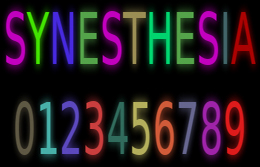aesth-, esth-, aesthe-, esthe-, aesthesio-, esthesio-, aesthesia-, -esthesia, -aesthetic, -esthetic, -aesthetical, -esthetical, -aesthetically, -esthetically
(Greek: feeling, sensation, perception)
2. Relating to a sensation felt in one part of the body as a result of stimulus applied to another part, as with referred pain: When Dr. Thomas tapped Jack's’ left knee, his right leg jerked in a synaesthetic response.
A Composition of What Someone Might Experience in His or Her Synaesthetic Experiences

2. A sensation felt in one part of the body as a result of stimulus applied to another area, as in referred pain: Sam noticed that whenever Dr. McMahon stuck a pin in the bottom of one of his feet, the other foot winced in synesthesia as if it were the one that was in pain.
3. The description of one kind of sense impression by using words that normally describe another feeling: The sound of some music can be described in tactile terms of synesthesia, such as hard, rough, coarse, smooth, etc.
4. A condition in which normally separate senses are not separated: Dr. Tweedie, the psychologist, was puzzled by Jane's description of her synesthesia, or her inability to distinguish between the input of her various senses and where they should be normally felt.
Characteristics of synesthesia
Sight may mingle with sound, taste with touch, etc. The senses are cross-wired, for example when a digit-color synesthete sees or just thinks of a number, the number appears with a color film over it.
A given number's color never changes. It appears every time with the number. Synesthesia can take many forms. A synesthete may sense the taste of chicken as a pointed object. Other synesthetes sense colors. Still others may have several senses cross-wired.
Estimates of the frequency of synesthesia range from 1 in 250,000 to 1 in 2,000. People with synesthesia are six times more likely to be female than male. Most synesthetes find their unusual sensory abilities enjoyable.
People with synesthesia often report that one or more of their family members also have synesthesia, so it may, at least in some cases, be an inherited condition.
It may be that synesthesia arises when particular senses fail to become fully independent of one another during normal development. According to this school of thought, all babies are synesthetes.
Synesthesia can be induced by certain hallucinogenic drugs and can also occur in some types of seizure disorders.
The words synesthesia is a hybrid of Latin and Greek and comes from Latin syn-, "together" + -esthesia, from the Greek aisthesis, "sensation" or "perception".
One example of synesthesia
Daniel Tammet is a high-functioning autistic savant. He can calculate huge sums in his head in seconds and instantaneously recognise prime numbers. One of fewer than fifty such people living worldwide, Daniel is unique in his ability to articulate his savant experience.
He describes his visual experience of numbers as complex "synaesthetic shapes" with color, texture, and motion. "Thirty-seven is lumpy like porridge, while eighty-nine reminds him of falling snow. Sequences of digits form visual landscapes in his mind."
2. Extrasensory perception of distant objects, events, etc.: Edwin claimed to possess telaesthesia in that he would appear to go into a trance and describe objects that were not actually visible.
2. A reference to a response to, or perception of, distant stimuli by extrasensory means: Although no one else heard the tolling of a bell, suddenly Marisa exclaimed that her telesthetic sense told her someone had died and she heard the toll of a church bell.
2. The ability to distinguish differences of temperature: As part of his science experiment, Noland learned to measure thermaesthesia in different animals.
3. A feeling in the body which recognizes heat and cold sensations: When Jason is either sweating or shivering, he is experiencing thermaesthesia.
2. Absence or loss of heat-perception; insensibility to heat: As a result of nerve damage in her hand, Quincy had thermanesthesia and so she had to be very careful when working in the kitchen.
![]() The index of anesthesia history, Parts 1, 2, and 3.
The index of anesthesia history, Parts 1, 2, and 3.
Related-word units meaning feeling: senso-; pass-, pati-; patho-.


